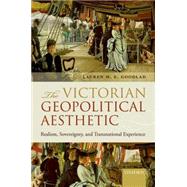The Victorian Geopolitical Aesthetic Realism, Sovereignty, and Transnational Experience
, by Goodlad, Lauren M. E.- ISBN: 9780198728276 | 0198728271
- Cover: Hardcover
- Copyright: 3/29/2015
How did realist fiction alter in the effort to craft forms and genres receptive to the dynamism of an expanding empire and globalizing world? Do these nineteenth-century variations on the "geopolitical aesthetic" continue to resonate today? Crossing literary criticism, political theory, and longue durée history, The Victorian Geopolitical Aesthetic explores these questions from the standpoint of nineteenth-century novelists such as Wilkie Collins, George Eliot, Gustave Flaubert, and Anthony Trollope, as well as successors including E. M. Forster and the creators of recent television serials. By looking at the category of "sovereignty" at multiple scales and in diverse contexts, Lauren M. E. Goodlad shows that the ideological crucible for "high" realism was not a hegemonic liberalism. It was, rather, a clash of modern liberal ideals struggling to distintricate themselves from a powerful conservative vision of empire while striving to negotiate the inequalities of power which a supposedly universalistic liberalism had helped to generate. The material occasion for the Victorian era's rich realist experiments was the long transition from an informal empire of trade that could be celebrated as liberal to a neo-feudal imperialism that only Tories could warmly embrace.
The book places realism's geopolitical aesthetic at the heart of recurring modern experiences of breached sovereignty, forgotten history, and subjective exile. The Coda, titled "The Way We Historicize Now", concludes the study with connections to recent debates about "surface reading", "distant reading", and the hermeneutics of suspicion.
The book places realism's geopolitical aesthetic at the heart of recurring modern experiences of breached sovereignty, forgotten history, and subjective exile. The Coda, titled "The Way We Historicize Now", concludes the study with connections to recent debates about "surface reading", "distant reading", and the hermeneutics of suspicion.







